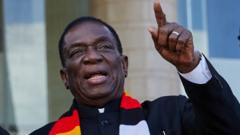In a strategic move, Zimbabwe's President Emmerson Mnangagwa has appointed Emmanuel Matutu as the new army chief, replacing Lt Gen Anselem Sanyatwe amid tensions arising from calls for the president's resignation due to claims of corruption and mismanagement.
Zimbabwe's President Appoints New Army Chief Amid Growing Protest Pressure

Zimbabwe's President Appoints New Army Chief Amid Growing Protest Pressure
Emmerson Mnangagwa's recent military reshuffle comes as he navigates increased calls for his resignation ahead of planned protests by war veterans.
Article Text:
Zimbabwe's President Emmerson Mnangagwa has announced the appointment of a new army chief, Emmanuel Matutu, as the nation braces for expected protests from war veterans demanding the president's resignation. This decision comes in the wake of increasing discontent within the ruling Zanu-PF party regarding how the president has managed the country's affairs.
Emmerson Mnangagwa, who took office in 2017 following the ousting of long-time leader Robert Mugabe, has faced mounting criticism from within his own ranks as well as the general public. The recently retired army chief, Lt Gen Anselem Sanyatwe, has been reassigned to a ministerial role in sports, arts, and culture, further indicating a shift in military leadership. Mnangagwa's tough reputation—earning him the nickname "The Crocodile"—is likely a factor in the urgency of this leadership transition.
Despite assurances from Mnangagwa that he intends to step down at the end of his second and final term in 2028, skepticism persists among the populace. Rumblings of discontent grew last year when rumors surfaced about potential efforts to retain power beyond the prescribed term. Such fears have evoked memories of the events leading to Mugabe's ousting, increasing the stakes as protests loom.
Authorities, including the security minister, have cautioned citizens against participating in the planned demonstrations, while police have implemented a four-day ban on the carrying of weapons and potential implements of violence in the capital. The ability of the war veterans to galvanize public support for their cause remains uncertain, but the tension in Zimbabwe continues to rise as the administration faces its most significant challenge yet.
Zimbabwe's President Emmerson Mnangagwa has announced the appointment of a new army chief, Emmanuel Matutu, as the nation braces for expected protests from war veterans demanding the president's resignation. This decision comes in the wake of increasing discontent within the ruling Zanu-PF party regarding how the president has managed the country's affairs.
Emmerson Mnangagwa, who took office in 2017 following the ousting of long-time leader Robert Mugabe, has faced mounting criticism from within his own ranks as well as the general public. The recently retired army chief, Lt Gen Anselem Sanyatwe, has been reassigned to a ministerial role in sports, arts, and culture, further indicating a shift in military leadership. Mnangagwa's tough reputation—earning him the nickname "The Crocodile"—is likely a factor in the urgency of this leadership transition.
Despite assurances from Mnangagwa that he intends to step down at the end of his second and final term in 2028, skepticism persists among the populace. Rumblings of discontent grew last year when rumors surfaced about potential efforts to retain power beyond the prescribed term. Such fears have evoked memories of the events leading to Mugabe's ousting, increasing the stakes as protests loom.
Authorities, including the security minister, have cautioned citizens against participating in the planned demonstrations, while police have implemented a four-day ban on the carrying of weapons and potential implements of violence in the capital. The ability of the war veterans to galvanize public support for their cause remains uncertain, but the tension in Zimbabwe continues to rise as the administration faces its most significant challenge yet.


















